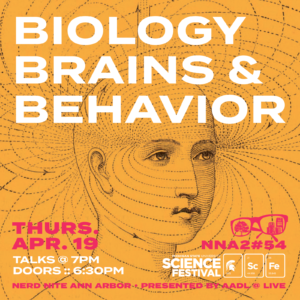For April, Nerd Nite A2 has teamed up with MSU’s Science Festival to bring you three amazing scientists talking about biology, brains, and behavior! Patsy Delacey will introduce us to the gelada monkey, and the study of the function of its’ “bleeding-heart” chest patch. Rosie Bettle uses chimpanzee behavior to explain why humans cooperate to create complex societies. Caitlin Posillico will explain how getting sick disrupts our capacity to learn, and how discovering why could lead to breakthroughs in diseases like Alzheimer’s. Lots of brilliance on display, so round up some pals and come advance your understanding of brains and behavior!
Patsy Delacey – The primate that wears its heart on its sleeve
Have you ever been curious about animal behavior? Have you wondered how animals communicate with one another? Do you love primates? Come learn about gelada monkeys – Ethiopia’s unique and wonderful highland monkey. Gelada monkeys are nicknamed “bleeding-heart monkeys” because of a patch of exposed red skin on their chests. Adult male gelada chest patches get brighter red when they’re excited, but this doesn’t happen for adult females, young males, or non-breeding males. Could the chest patch be an ornament to attract females, like a peacock’s plumage? Or does it signal to other males to back off? How does the environment influence signaling? I’ll discuss all of this and more about my field research in the Simien Mountains.
About Patsy:
Patsy is a biopsychology PhD student at the University of Michigan, studying how its high-altitude environment has shaped gelada monkey physiology and behavior.
Rosie Bettle – Thinking Like a Primate
Humans are a really weird species. In particular, we cooperate a lot, and this helps us build up complex societies. What kinds of mental abilities help us to cooperate, and do other species also use similar mental abilities to help them cooperate? To start answering this question, I will be talking about cooperation in our closest living relatives: chimpanzees.
About Rosie:
Rosie is a PhD student at the University of Michigan, who studies how primates think about the world. When she isn’t thinking about the mental lives of monkeys, she is usually exploring Kerrytown, trying to find new nature-y spots, or sampling a different craft beer.
Caitlin Posillico – Brain fog from brain sickness
People get sick all the time, and sometimes it happens with the WORST timing. Maybe you’re supposed to take a big exam, attend an important meeting, leave for a business trip, or even take a vacation, but now all you can think about is how sick you are. What happens to our memory capability when this happens? Is this going to prevent us from being able to learn the new information being presented at the meeting? Is it going to prevent us from recalling the definition of that big term you learned about last week? Importantly, does this affect males and females differently? Caitlin’s research tries to figure out some possible answers to these questions using a viral mimic in male and female mice during different types of learning and memory tasks. If we can figure out how getting sick disrupts our capacity to learn and remember, maybe we can gain some insight as to how neurodegenerative diseases like Alzheimer’s Disease or psychological disorders like Post-Traumatic Stress Disorder cause debilitating memory impairments, and ideally, how we might be able to fix them.
About Caitlin:
Caitlin is a PhD student at the University of Michigan studying sex differences in the impact of neuroimmune activation on learning and memory. Essentially, she’s interested in what happens to memory when the brain gets sick and whether or not it affects males and females in the same way. She got her bachelor’s and master’s degrees in Neuroscience at the University of Delaware (Delawhere? east coast!) where she fell in love with the brain, neuroimmunology, and academia. Originally hailing from Long Island, NY, she has (proudly) lost her accent and is loving the friendliness of Midwestern life. When she’s not locked in the lab or office, you can find her watching Netflix and looking for new ways to incorporate pesto into every meal.
